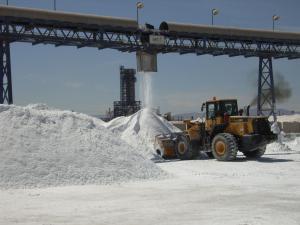Privatization Profiteers from Pinochet’s Chile May Yet Face Prison

SQM Saltpetre Facility. Photo: turbotorbs. Used under Creative Commons license
Julio Ponce, the billionaire owner of Sociedad Quimica & Minera de Chile (SQM), faces ten years in prison for insider trading. A beneficiary of former dictator General Augusto Pinochet, Ponce is charged with buying company shares at below market prices and selling them at a profit.
SQM – often referred to as Soquimich – is one of the world’s biggest producers of potassium nitrate, iodine and lithium which it produces with raw materials sourced from its caliche ore and brine mines in the Atacama desert. Originally a state enterprise, SQM was privatized by Pinochet in 1988 at the bargain basement price of $120 million on the advice of the International Monetary Fund (IMF).
The man in charge of privatization in Chile was Ponce, who trained as a forestry engineer, but had the good fortune of marrying Veronica Pinochet, the daughter of the president. Pinochet appointed Ponce to the board of SQM before it was privatized.
“Call it business savvy plus political connections on overdrive,” writes Erin Carlyle at Forbes magazine.
Ponce became president of the privatized nitrate company in 1987. Several of his relatives became major stockholders and had positions on the board of directors of the company.
Today SQM is worth $9.2 billion. Ponce has 84.1 million shares in the company, according to SQM filings with the Securities and Exchange Commission (SEC) making him worth $3.3 billion.
“It is obvious that Ponce Lerou’s family ties and public posts helped him to put together the prosperous economic state that he enjoys today,” Maria Olivia Monckeberg, author of “The Looting of the Chilean State by the Economic Groups,” told the New York Times. “He created a network of relatives and business partners that came to occupy the highest posts in some of the most important state companies, not just Soquimich, but also the state-owned copper and steel companies.”
The Chilean taxpayer was not as fortunate, write Joseph Collins and John Lear in Multinational Monitor in 1991.
“Revenues from sales of public corporations provided one-time boosts to the government budget, allowing Pinochet the luxury of balancing the budget from 1986 through 1988, pleasing the IMF, making timely payments to foreign creditor banks and even cutting taxes,” write Collins and Lear. “However, since the companies sold had produced revenues for the government rather than deficits, such gains were brief and illusory.”
Today Ponce and his friends have continued to profit from the company, say Moneda Asset Management, a minority shareholder in SQM. They allege that Ponce and his friends conducted over 100 irregular purchases of shares between 2009 and 2011, which they used to make over $100 million in profits.
For example, Bloomberg writes that on March 29, 2011, Soc. de Inversiones Oro Blanco SA (a company controlled by Ponce) sold 163 million Soc. de Inversiones Pampa Calichera SA shares at 726 pesos, 10 percent below the previous day’s price, to Norte Grande and SQ Inversiones. On November 7 of the same year, Potasios de Chile SA bought 151 million shares in Calichera for 1064.53 pesos while SQ Inversiones sold 137 million at 1065 pesos.
Ponce has until the end of this month to explain the trades. Also charged are Aldo Motta, chief executive of Norte Grande and Roberto Guzman, an advisor to Ponce.

